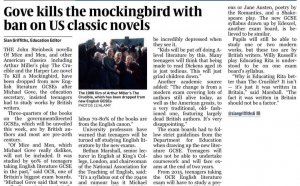
Influential writers
 By Lauren Bailey
By Lauren Bailey
The written word has the power to generate ideas, inspire revolutions, and change the way we view ourselves and our place in history. Nowhere is this power more clear than in the works of the authors on this list. These 25 writers changed the world and its writing with their style and beliefs, and the works they created — from fictional epics to philosophical creeds — have had a lasting impact on people and cultures around the world. (And more than a few have won the Nobel Prize to prove it.) Even if they aren’t required reading for an online college course, you should do yourself a favor and check them out.
- William Faulkner: One of the most influential authors to ever come out of the Southern United States, William Faulkner churned out a body of work in the early 20th century that took a few years to find acceptance among a wider audience. Between 1929 and 1936, he released four novels — The Sound and the Fury, As I Lay Dying, Light in August, and Absalom, Absalom! — that would define his stream-of-consciousness style and his explorations of morality using characters set in his native Mississippi. He also wrote screenplays for director Howard Hawks, contributing to The Big Sleep and To Have and Have Not, but it was his literary body of that earned him the Nobel Prize in 1949, which brought him a new level of fame. He’s influenced countless writers from the South and across the country.
- Gabriel Garcia Marquez: Born in Colombia in 1927, Gabriel Garcia Marquez first made his literary mark as a journalist, during which time he and a few other writers formed the Barranquilla Group to share works and inspire each other. Later venturing into fiction, Garcia Marquez wrote One Hundred Years of Solitude, a dazzling work inspired by his home country and the war he had seen. The book was the author’s first major work to dabble in magical realism, a blending of genres that would color his body of work for decades. He also wrote Love in the Time of Cholera, a non-traditional love story that approaches romance from a unique point of view. His lifelong explorations of relationships and isolation have earned him the Nobel Prize.
- Henrik Ibsen: Henrik Ibsen, born in Norway in 1928, is widely regarded as one of the most pivotal figures in modern drama and a founder of the modernist movement in theater. His plays were groundbreaking for the way they frankly addressed social and moral issues of the day with much more directness than Victorian society tended to prefer, turning Ibsen into a sensationalist presence in the theater world. A Doll’s House is perhaps his most famous work from his extensive body of plays, and is memorable for its attack on 19th-century marriage and its anti-feminist trappings. (Like many of the authors on this list, Ibsen’s work became a touchstone for a disenfranchised class of people, in this case, women.) Later works like Hedda Gabler and The Master Builder went even further, eschewing Victorian commentary altogether to grapple with complex moral issues.
- Franz Kafka: How many writers make such an impact that their name becomes an adjective describing works reminiscent of their own style? These days, whenever a story takes a surreal or horrific turn that highlights the unconquerable complexity of a faceless system, it’s called "Kafkaesque." The Trial is a harrowing novel about a man persecuted by an omniscient authority for a crime whose nature is never revealed. The Metamorphosis is a similarly disturbing book in which the narrator awakens to learn he’s turned into a giant bug. Kafka’s stories probe the darker and less traveled areas of the human condition, and though he was only 40 when he died in 1924 (he starved to death when tuberculosis made eating too painful), his works earned him a reputation as one of the most original writers of the 20th century.
- William Butler Yeats: The first Irishman to ever win the Nobel Prize for literature, William Yeats was a groundbreaking poet whose work ushered in that portion of the Celtic Revival referred to as the Irish Literary Revival, a movement in the early 20th century which Yeats and other writers brought Irish writing to a wider audience. His use of symbolism within traditional poetic style inspired generations of other writers. His poem "The Second Coming" contains many powerful and now-famous uses of Christian imagery in its social criticism.
- Mary Wollstonecraft: The mother of Frankenstein author Mary Shelley was an accomplished writer and public figure long before her daughter’s novel shook the world. Mary Wollstonecraft, born in 1759, was a pioneering force in British feminism and philosophy. Her most famous work is A Vindication of the Rights of Woman, in which she argued that women deserved as much education and as many opportunities as men, and that for society to regard women as ornaments for their husbands instead of companions was to do them a tragic disservice. Published in 1792, just five years before she died, Wollstonecraft’s treatise became a cornerstone in the growing intellectual movement to grant women equal rights with men.
- Henry David Thoreau: Without the 19th-century writings and observations of Henry David Thoreau, the 20th century might have gone very differently. His earnest reflections on peace and nature in Walden inspired thousands of naturalists, and his book Civil Disobedience, in which he argues of the necessity of peacefully resisting an immoral government, was a touchstone in the lives of Mahatma Gandhi and Dr. Martin Luther King, Jr. Thoreau was also an ardent abolitionist and leader in the field of transcendentalism, which (basically) taught that a person’s perfect spiritual state was best attained through their own intuition and not through established religions.
- Frederick Douglass: Born into slavery before escaping to freedom, Frederick Douglass was a leading light in the abolitionist movement of the 19th century, and his writings allowed him to travel the world and speak on behalf of equality and justice. He wrote three autobiographies tracing his life and journeys, and each of them is a classic: Narrative of the Life of Frederick Douglass, an American Slave; My Bondage and My Freedom; and Life and Times of Frederick Douglass.
- Upton Sinclair: Upton Sinclair’s work as a journalist and novelist were integral in some of the biggest changes in the fields of industry and public health in the first half of the 20th century. His 1906 novel The Jungle was a peak in the muckraking movement (the journalistic practice of exposing corruption at high levels), and Sinclair spent weeks undercover at a meat-packing...
RELATED VIDEO



Share this Post
Related posts
Greatest Books Ever written
The sport has inspired some of our best writers, who’ve tackled everything from fandom to concussions. This reading list…
Read MoreList of American Literature authors
The tradition of storytelling has always been a fundamental part of Native American life. The history of oral tradition is…
Read More










